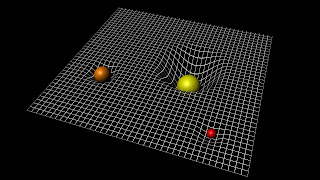 |
| Roadrunner is a bit of a meanie when it comes to teaching gravity |
Considering that it is the most abundantly every-day force that a person will experience, the scientific community has very little idea what it is. That being said we have a pretty good idea how it works. We shall start at the beginning with everyone's favourite scientific anecdote: The Apple and Issac Newton. So the story goes, Newton was sitting under a tree one day when an apple fell on his head and it got him wondering about why things fell down to the ground. The answer? Gravity.
 |
| The apple started everything. |
Now, this is a decent way of explaining what gravity does, "things fall down, because of gravity". And sure in day to day life that is basically all we really need to understand about how this mysterious force works. However we aren't here to explain what you already know, so let's delve deeper. If we scale up the idea of objects falling down and take an observation from space, obviously down is a bit subjective. So it's perhaps more accurate to say "things fall towards the ground, because of gravity". Better, yes, correct, sort of. The problem with that definition is it's a bit geo-centric, what about the rest of the solar system? Not everything falls towards the Earth if it did we'd be in a lot of trouble. I don't fancy having the entire Asteroid belt falling to Earth anytime soon.
So what is the better way to explain Newton's theory of gravity? It would be more apt to say "objects move towards each other, because of gravity", it's just the amount things move is dependant on their mass. Accidentally dropping your cup of tea doesn't suddenly cause the Earth to shift a few feet to meet the beverage in the middle. The mass difference between the two objects means that the Earth doesn't really register the action. Newton devised an equation to showcase the gravitational pull an object has, depending on its size, and its distance from the object it is affecting.
Excellent we've got a working theory, an equation which works, even to the point of predicting the orbits of the planets and moons, job done. Well not quite, this is where an old favourite of ours turns up at the start of the 20th century and claims the works of the curled-haired Englishman are merely an approximation of gravity. This man was the legendary Albert Einstein, this time with his Theory of General Relativity (you can find an article discussing Special Relativity here). In his hypothesis, Einstein argued that gravity wasn't so much a force but instead it was a geometry of the universe. Okay, that sounds confusing, doesn't it?
 |
| It's a battle of the brains as old school comes up against new age thinking. Isaac "Apple Thrower" Newton vs Albert "It's all Relative" Einstein! |
 |
| Objects with mass warp time and space, just by existing. Yes even you, you have an effect on the universe, think about that next time you're feeling a bit down. |
Gravity is a tricky beast, but crucial to the universe on so many scales, hopefully, you've learnt more about how it works, and the effect it has on the world. If you have any further questions don't hesitate to comment below, or find us on Facebook, Twitter, and Tumblr. We are always on the lookout for new topics to write about, so if there is something you're desperate to find out more on, message us and we'll see what we can do.
Comments
Post a Comment